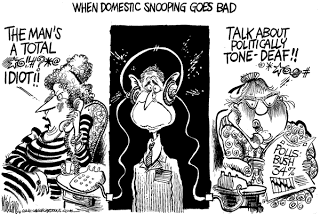Watching The Detectives … Can Land You In Jail

Once may be an anomaly, twice a coincidence, but three or more instances constitute a pattern.
Bear that axiom in mind as we review some cases in which citizens have been charged with illegal “wiretapping” — a felony – for the supposed offense of recording their encounters with law enforcement personnel.
Police in Rochester, New Hampshire found 48-year-old Christopher A. Power sitting in his car while apparently inebriated. The engine was running, and Power was sitting behind the wheel, but a good attorney could make a case that he was not “operating” the vehicle for the purpose of being charged with a DUI. He told the police that he was “stressed” and upset, and was listening to his stereo in the hope of dispelling his foul mood.
After the police removed Power from his vehicle, they discovered a mini-cassette recorder he had used to document the entire incident. In addition to being charged with driving while intoxicated, Power was slapped with a wiretapping charge, which is a Class B felony.
Power’s case is somewhat similar to that of Nashua, New Hampshire resident Michael Gannon, who was arrested and charged with illegal wiretapping last June 27. Gannon’s fifteen-year-old son was suspected of involvement in a very serious crime, an armed mugging that had taken place outside a restaurant a few days earlier. The police were very persistent in pressing Michael and his wife Janet for information regarding their son’s whereabouts – an attitude that contrasted sharply with their previous performance when Michael, a disabled veteran, was on the receiving end of violent crime.
“We’ve had four break-ins,” Janet told the Nashua Telegraph. “One guy came right up our stairs and started beating on my husband, and we called the cops.” Following a subsequent break-in involving a camper on their property, an officer told the Gannons they were “too rich” for the neighborhood and should move out.
Without reasonable hope for help from the police, the Gannons purchased a closed-circuit audio and video security system and posted a sign on their house warning visitors that their actions were being recorded.
After their son ran afoul of the law, the police became a constant and, unfortunately, intimidating presence in the neighborhood.
Michael Gannon (r.) with his wife Janet and their troubled fifteen-year-old son, who was charged with involvement in a mugging. That is a serious crime; video- and audio-taping police interviews is not a crime of any sort. (Nashua Telegraph photo.)
“There were six cops in the yard” after the 15-year-old son was identified as a suspect, Janet recalls. Detective Andrew Karlis made repeated visits to the home at times seemingly chosen for their inconvenience – late at night, or during dinner. “He made several rude remarks about Mike being a disabled vet and about the taxes we pay on the house,” Janet declares. “He … also put his foot in the door as Mike tried to close it and we asked him to leave, but he wouldn’t.”
The Gannons’ neighbors in the four-unit building took note of the number of police visits the Gannons were forced to endure, and the less-than-professional conduct of the officers involved.
“They said they were going to keep coming back every night,” recounts Trisha Lessard, a neighbor. “They were keeping us up. They scared me, and I have two police officers in my family.”
At one point a young mother, her small child in tow and very pregnant with another, arrived at the building and couldn’t get into her parking space, which was blocked by two police cars. A resident politely asked an officer if the cars could be moved to accommodate the young mother. The officer brusquely replied: “I’ll move when I’m done.”
Lessard, who witnessed the exchange, leaned in the direction of another officer to read his name or badge number.
“He said, `What are you looking at?’… I said, `I’m looking for your badge number.’ He said, `It’s none of your G—damned business.’… I was just taken aback by their rudeness.”
Michael Gannon, bearing the full brunt of that rudeness, eventually lost his composure. He recalls telling the investigators “`Goodnight, gentlemen’ about forty times” in a futile effort to dismiss Detective Karlis and his comrades, before finally snapping and ordering them to “get the F**K out of my house.” During a subsequent visit, Mr. Gannon drew attention to the home security system by inviting Karlis to “smile” for the camera.
Finally, in exasperation, the Gannons went to the local police station to file a misconduct complaint against Karlis. Significantly, that complaint was eventually upheld by Police Chief Timothy Hufferan, who admitted that “one of our detectives [presumably Karlis] did not afford a member of the public the level of courtesy that they expect and deserve, regardless of how provocative, uncooperative or disrespectful that individual may have been to the officer during the same encounter.”
However, this vindication came only after Michael Gannon – along with Janet and their 18-year-old son Shawn — were all arrested. (.pdf) He was booked on two felony counts of eavesdropping and wiretapping; Janet and Shawn were both charged with disorderly conduct (which most likely means that they volubly expressed their incredulous disgust over Michael’s spurious arrest), and Shawn was also charged with “resisting detention.”
A search warrant (.pdf) was obtained and the police ransacked the Gannon home, seizing videotapes and tearing the cameras from their fixtures. The Gannons were kept outside their home for several hours while this act of vandalism was underway.
Janet eventually had to post $10,000 in bail to get her husband out of jail. He faced a possible 21-year-prison sentence.
“I don’t want to run him through the wringer here,” insisted Chief Hefferan, his hand steadily turning the crank on the wringer through which he was feeding the hapless 39-year-old man. The Chief and Hillsborough County Attorney Marguerite Wageling offered Gannon a deal: Plead guilty to one misdemeanor charge of evidence tampering, and he’d receive a 30-day suspended jail sentence.
To his credit, Gannon rejected the deal, and the wiretapping charges – which were palpably fraudulent to begin with – were dropped. His fifteen-year-old son was arrested and charged in connection with the mugging, but it’s difficult to see how any other family member had done anything to merit the treatment they had received.
So we have two examples of citizens facing wiretapping charges for the supposed offense of recording their interactions with police. I’m confident to the point of a moral certainty that at least a few more cases of this kind can be turned up.
In fact, I’m surprised that charges of this sort weren’t filed against Eugene Siler and his wife after they secretly recorded the two-hour torture session Eugene endured at the hands of police in Franklin County, Tennessee, or against Denver CopWatch activist Evan Herzoff for recording his conversation with the officer who arrested Herzoff after being asked for his business card.
I maintain that, to the extent it’s possible, citizens should always record their encounters with police – just as police record them — for the safety of both parties. As the technology to do so becomes nearly ubiquitous, police are apparently learning to use wiretapping laws to counteract citizen efforts to document police encounters.
Unlike many other forms of abusive conduct by law enforcement officers, this particular tactic admits of a relatively simple remedy: State legislatures can amend eavesdropping statutes and wiretapping laws to specify that they do not apply to those bearing police credentials and acting in an official capacity. Accepting those credentials should constitute implied consent to having one’s official actions recorded at any time.
The logic of this suggestion seems unassailable to me. But then again, this doesn’t address the fundamental assumption of privilege that tacitly undergirds the actions of those who act in the name of the State: They’re the Government, and we’re not.
Remember to keep checking in at The Right Source!
Content retrieved from: http://freedominourtime.blogspot.com/2007/06/watching-detectives-can-land-you-in.html.





























